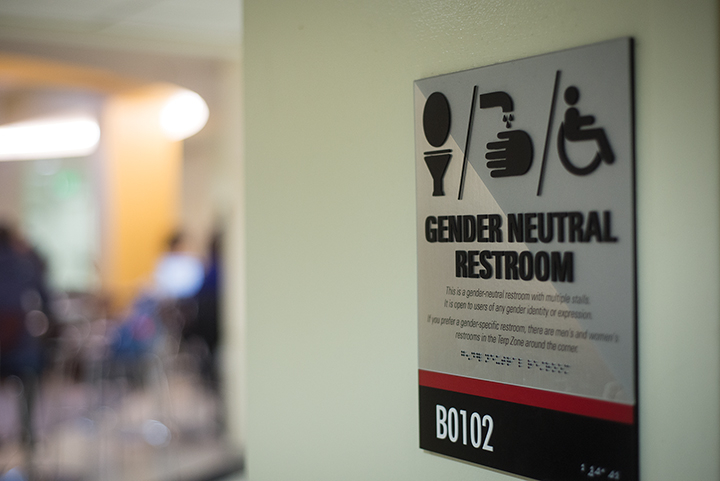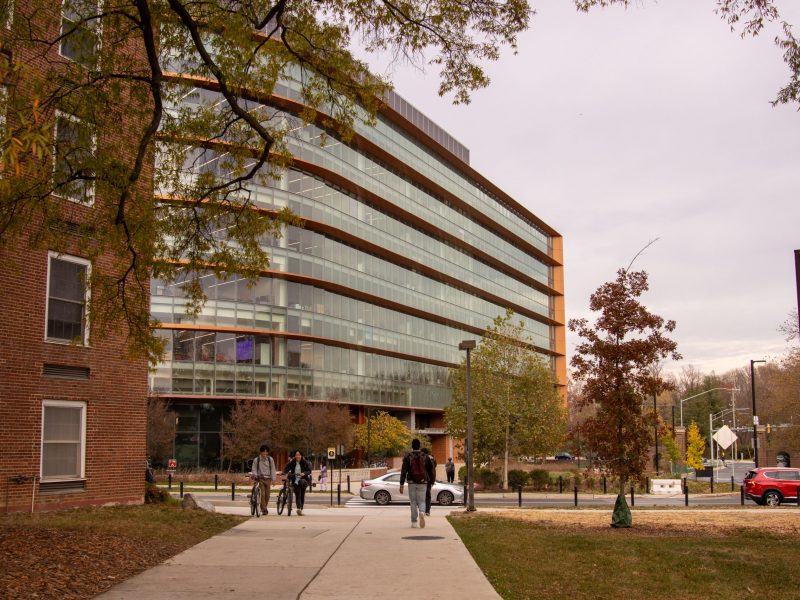President Trump’s Feb. 22 directive rescinding federal protection for transgender students who wish to use school bathrooms matching their gender identities does not directly affect University of Maryland students, said Luke Jensen, director of this university’s LGBT Equity Center.
“From a policy and practice standpoint, the Trump administration’s failure to support the previous ‘Dear Colleague Letter [on Transgender Students]’ has no impact on us,” Jensen said.
Patrick Paschall, a Hyattsville city council member and the executive director for FreeState Justice — a Maryland LGBT legal advocacy firm — said though the Trump administration’s order will not affect the policies on the campus, it sends a dangerous message to transgender students around the nation.
[Read more: SGA passes three resolutions urging for more gender-neutral bathrooms on campus]
“It just changes what the public posture of the administration is toward transgender students,” he said, adding the controlling law in the country’s Fourth Circuit, where this state is located, includes protection for transgender students within Title IX.
The previous Dear Colleague letter, published in May 2016, “prohibits sex discrimination in educational programs and activities operated by recipients of federal financial assistance,” including discrimination against students for their gender identities. The Trump administration released a new version of the letter Feb. 22, stating the Obama administration’s guidance did not go through necessary procedures and analysis and there must be “due regard for the primary role of the States and local school districts in establishing educational policy.”
Jensen said he worries the order will send a negative message to LGBT students and could cause bullying issues that affect their ability to get accepted to this university and others. Students who are bullied can sometimes have lower attendance and suffer from lower grades, he said.
This university does not have a written policy allowing transgender students to use the restrooms of their choice, Jensen said, but it interprets anti-discriminatory Title IX legislation to include protections for students based upon their gender identities. Jensen said he plans to submit a proposal to the University Senate to codify this protection for transgender students.
The U.S. Supreme Court case featuring Gavin Grimm, who sued the Gloucester County School Board in Gloucester County, Virginia, for not allowing him to use the school bathroom matching his gender identity, will determine the nation’s prevailing law. The case will go before the court this month.
The campus is progressing when it comes to providing inclusive spaces and bathrooms for transgender students, but could be doing more, Jensen said.
“We’re not in a horrible place,” he said. “We’ve made some progress, but now let’s standardize that progress and move forward and have a real thoughtful plan, rather than a series of ad hoc decisions.”
[Read more: Feel free to pee: The malignancy of sex-segregated bathrooms]
In December 2015, this university’s Student Government Association passed three resolutions urging university officials to consider placing gender-inclusive bathrooms in campus dorms and dining halls, Eppley Recreation Center and Ritchie Coliseum.
Newly-constructed campus buildings must feature a gender-inclusive bathroom, which can be either single user or multi-user, but previously constructed buildings aren’t held to the same standard, according to university policy. Facilities Management can convert existing bathrooms upon request.
Jensen said he plans to set forth a multi-year plan in his proposal to the University Senate for providing uniform gender-neutral bathrooms in older campus buildings. Some aspects of current gender-inclusive bathrooms vary widely, including the space between the stall doors and the floor, he said. He hopes to see this change, as this space should be minimized to enhance privacy and standardized among all gender-neutral bathrooms on the campus, he added.
For Shakun Kaushal, a sophomore communication major, Trump’s actions didn’t make sense.
“First of all, you’re born knowing you’re not the gender you are, which is hard enough,” Kaushal said. “Then you go through the effort of actually accepting it, which is very courageous, so to deny someone the right to use the bathroom they feel the most comfortable with — I think it’s just very wrong.”



